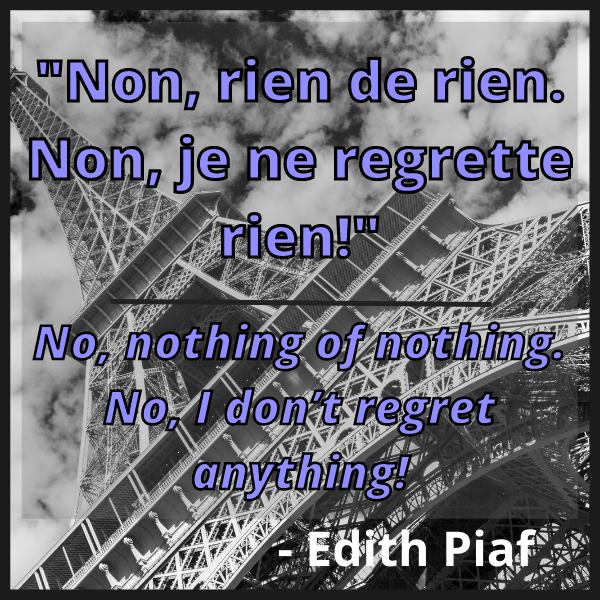Have you ever felt the bitter sting of regret, wondering if things would have been different if you had only made a different choice? Edith Piaf, the legendary French chanson singer, captured this universal human experience in her iconic song, “Non, Je Ne Regrette Rien” (No Regrets). Beyond its catchy melody and Piaf’s signature raspy voice, the song holds a powerful message about facing the past with unflinching resolve and moving forward with a newfound sense of freedom.

Image: www.frenchlearner.com
This article delves into the lyrics of “Non, Je Ne Regrette Rien,” exploring its layers of meaning and dissecting the emotions that Piaf so vividly portrays. We’ll also examine the song’s historical context and its enduring impact on music and culture. By unraveling the complexities of Piaf’s lyrics, we gain insights into the human experience of regret, resilience, and self-discovery.
A Life Shaped by Regret
Edith Piaf’s life was one of tragedy and triumph, marked by poverty, loss, and a deep-seated fear of abandonment. Her personal experiences, woven into the fabric of her music, often mirrored the raw emotions she so powerfully conveyed. In “Non, Je Ne Regrette Rien,” the lyrics are a reflection of Piaf’s own journey, a testament to her strength and her unwavering determination to rise above the hardships that had shaped her life.
A Meaning Deeper Than Words
The song’s title, “Non, Je Ne Regrette Rien,” translates literally to “No, I Regret Nothing.” However, the depth of the sentiment transcends a simple denial of remorse. The lyrics explore a complex interplay of emotions, encompassing both the pain of past experiences and the liberating acceptance of the present.
Verse by Verse: A Journey Through Regret
To truly grasp the meaning of “Non, Je Ne Regrette Rien,” it’s crucial to analyze the lyrics verse by verse. To understand the nuances of Piaf’s lyrics, we need to look beyond a straightforward translation and consider the context of her life and the message she was trying to convey.

Image: xosuey.com
Verse 1: The Scars of the Past
The first verse begins with a sense of defiance, a declaration of emotional independence:
“Non, je ne regrette rien, ni le bien que j’ai fait,
Ni le mal que j’ai fait, il fallait que ça soit.”
(No, I regret nothing, neither the good I have done,
Nor the bad I have done, it had to be.)
Here, Piaf acknowledges both the good and bad deeds of her past, emphasizing the inevitability of all her actions. She refuses to dwell on remorse, choosing instead to accept her choices and their consequences with a sense of inevitability.
Verse 2: Breaking Free from the Chains of the Past
The second verse takes on a more resolute tone, with Piaf declaring her liberation from past attachments:
“C’est fini, c’est fini, la vie m’a donné bien des coups,
Mais je m’en suis sortie toujours, il n’y a pas de coups durs.”
(It’s over, it’s over, life has dealt me many blows,
But I’ve always gotten out, there are no hard blows.)
This verse conveys a sense of resilience and hard-won independence. Piaf acknowledges the pain she has endured, yet with unwavering determination, she emphasizes her ability to overcome whatever life throws her way.
Verse 3: The Triumph of Self-Discovery
In the third verse, Piaf’s acceptance of her past leads to a profound sense of self-discovery:
“J’ai la vie devant moi, je n’ai plus besoin de rien,
J’ai tout ce qu’un coeur peut rêver, j’ai retrouvé mon chemin.”
(I have life ahead of me, I no longer need anything,
I have all that a heart can dream of, I have found my way.)
This verse reveals a newfound freedom and a sense of purpose. Piaf no longer carries the weight of the past. Having faced her own demons, she has found her way and gained a sense of fulfillment.
A Song for the Ages
“Non, Je Ne Regrette Rien” became a global phenomenon. It was translated into numerous languages and covered by countless artists, from Marlene Dietrich to Cher. Its enduring popularity speaks to its universal appeal, reaching beyond language barriers and cultural differences.
A Legacy of Hope and Resilience
Beyond the lyrics, Edith Piaf’s performance of “Non, Je Ne Regrette Rien” is a masterclass in emotional intensity. Her raw voice, her unwavering gaze, and her powerful delivery resonate deeply with listeners, making them feel the full weight of her message. The song serves as a beacon of hope, reminding us that it is possible to rise above the challenges of life and find meaning and purpose even in the face of regret.
Beyond the Song: The Power of Acceptance
“Non, Je Ne Regrette Rien” transcends its musical boundaries, serving as a powerful reminder of the transformative power of acceptance. By facing our past with courage and honesty, we can release ourselves from the chains of regret and embrace the freedom to live fully in the present moment.
Edith Piaf Non Je Ne Regrette Rien Lyrics Translation
Exploring Further
To delve deeper into the world of Edith Piaf and her music, you can explore the following resources:
- Biographies: “Edith Piaf” by Douglas Kendrick and “Piaf: A Life” by Simone de Beauvoir.
- Films: “La Vie en Rose” starring Marion Cotillard, and “Edith Piaf: The Early Years.”
- Music: Listen to Edith Piaf’s complete discography, including her original recordings of “Non, Je Ne Regrette Rien” and other iconic songs.
By exploring the world of Edith Piaf and her powerful message in “Non, Je Ne Regrette Rien,” we gain insights into the human experience of regret, resilience, and the journey of self-discovery.





